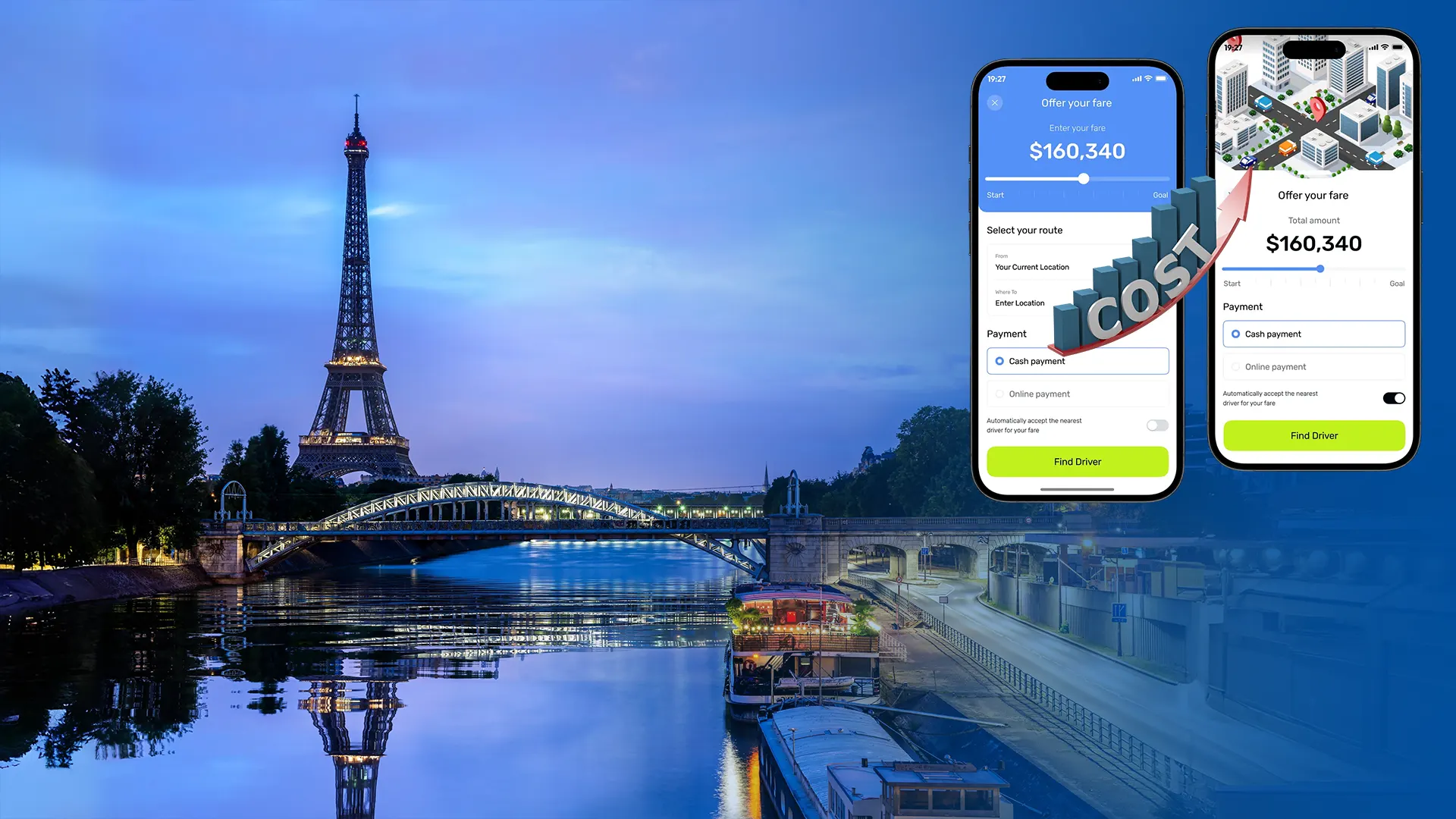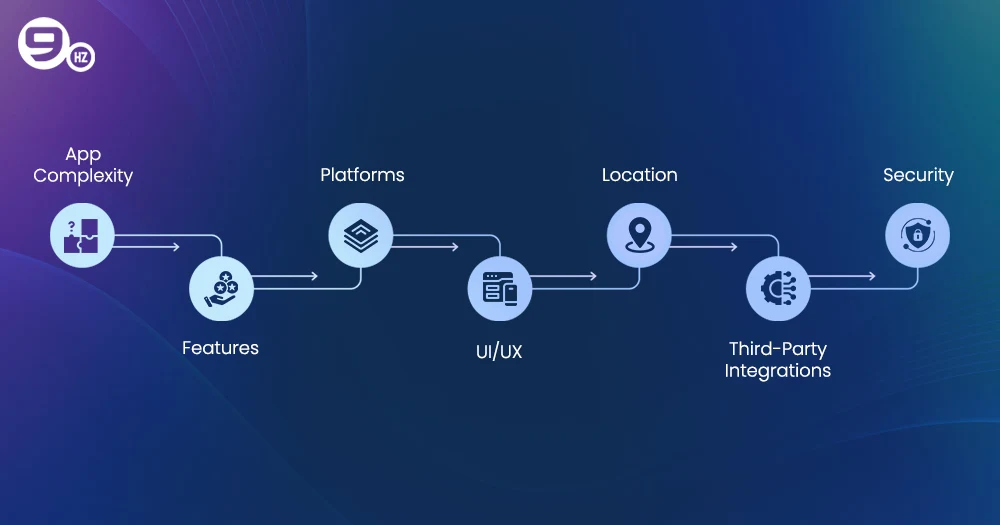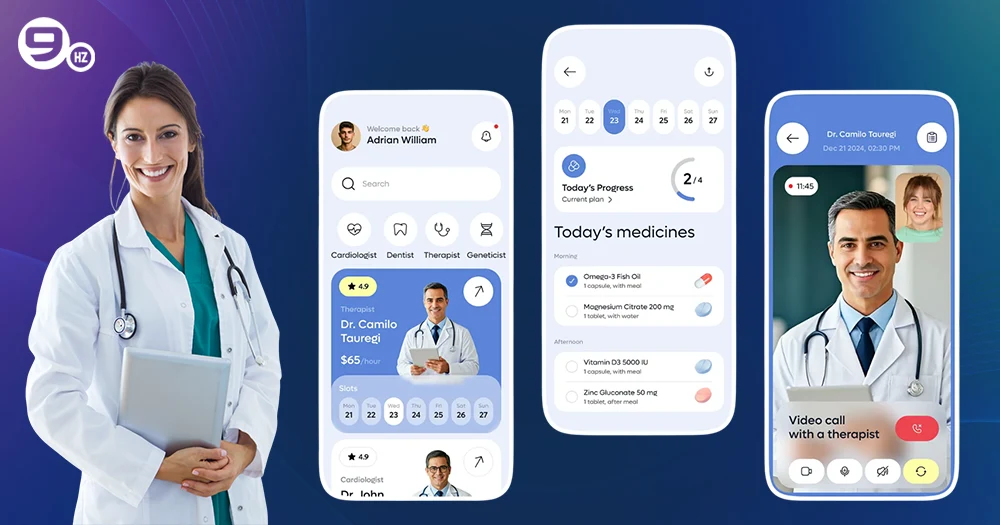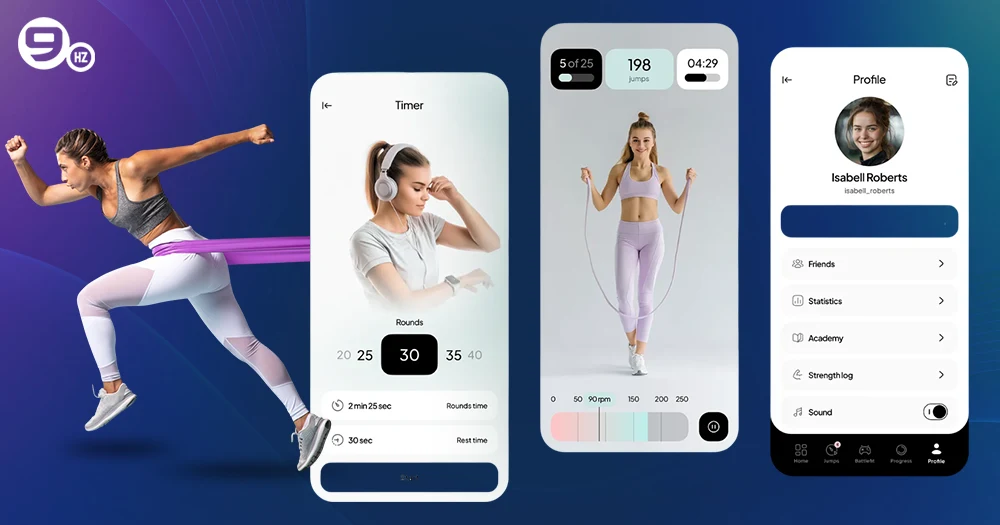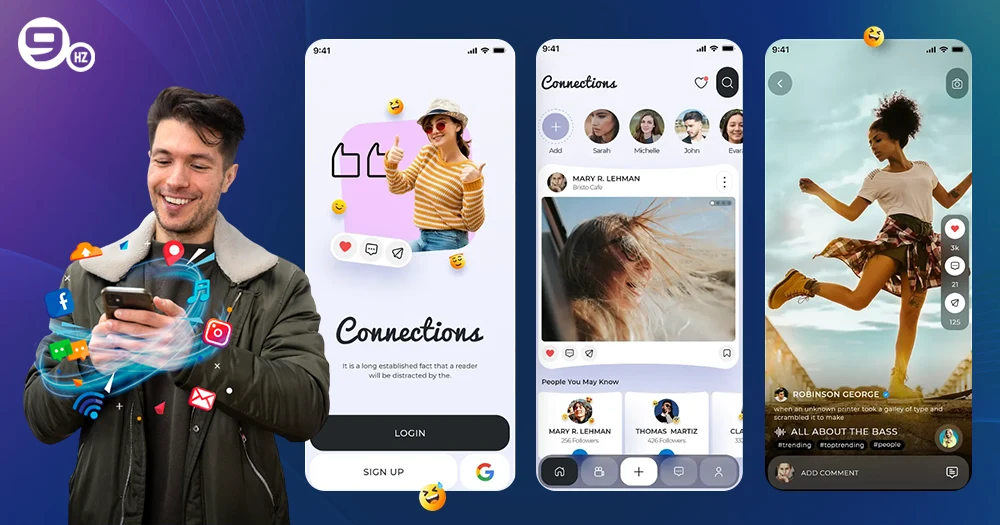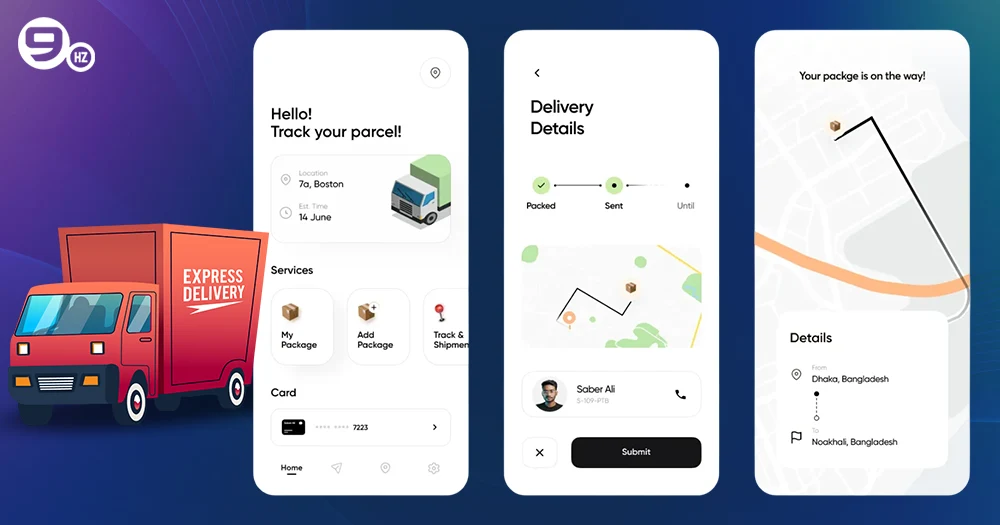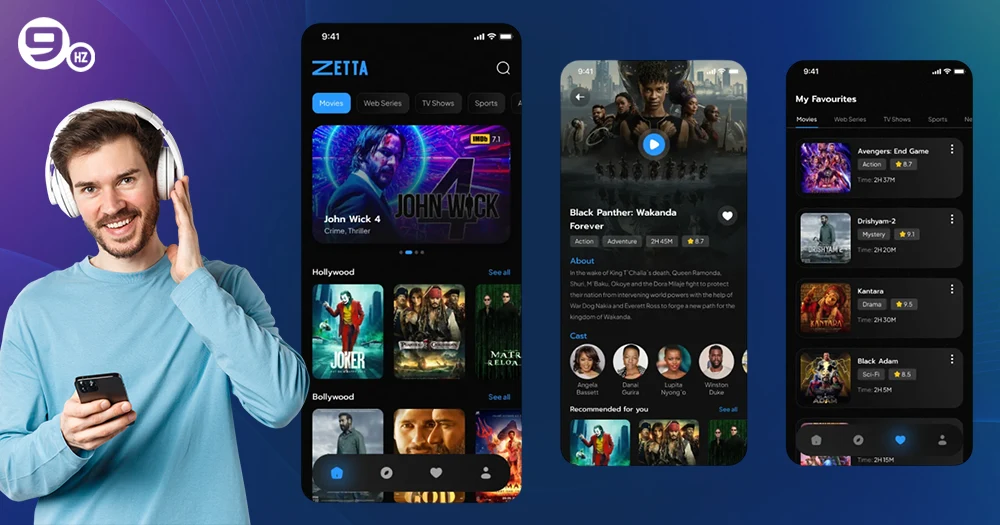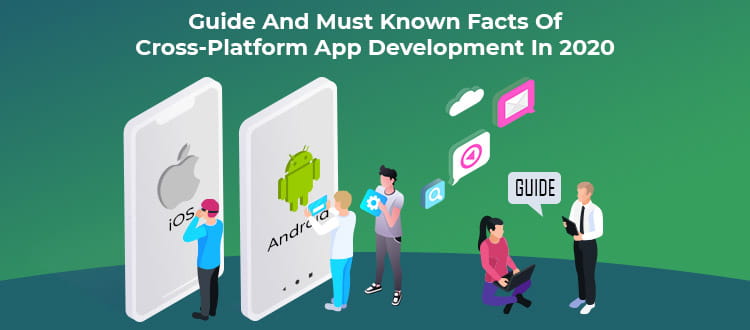Did you know that over 300 billion mobile applications were downloaded globally in 2024? As global usage continues to increase, businesses that do not position themselves in an app will become obsolete in the digital age.
As competitiveness increases within the industry and France is still a hotspot for mobile-first projects, many businesses will have to find new markets to engage their growth trajectory. With a sound digital infrastructure and an ever-expanding tech talent pool, coupled with being a leading marketplace for scalable mobile solutions, it is important that businesses understand what is mobile app development cost in France; otherwise, they risk overspending on developing their digital product strategies while missing valuable opportunities to competitors in a high-competition space.
Understanding the cost landscape allows you to not only have a competitive edge but also ensures your investment is within commercial reality while meeting your business objectives. If you are looking custom mobile app development services, The NineHertz is the leading mobile app development company in France.
What is Mobile App Development?
Mobile app development entails the process of writing software applications for use on mobile devices such as smartphones and tablets. Mobile applications may be developed for iOS, Android, or developed with cross-platform technology that serves both iOS and Android users.
The app development process can consist of multiple stages: idea validation, UI/UX design, front-end development, back-end development, testing, and deployment. Depending on the needs of the business, the app may be planned as a native (specific for that app) application, a hybrid, or a web app.
Mobile applications exist in every industry, from banking and e-commerce to healthcare and social networking. Mobile apps allow businesses and organizations to maintain user connections while streamlining processes and offering personalized experiences in real time.
Pro Tip: Always define your app’s core purpose and target users before development. This helps minimize unnecessary features and reduce overall cost.
Mobile App Development Cost in France [An Overview]
It is essential to grasp the mobile app development cost in France to make accurate business decisions. Building a basic MVP with limited features is one thing, but an enterprise solution with multiple features will see a variation in cost depending on complexity, design, and the development process used.
The table below provides a guide to the roughly estimated mobile app development cost in France for all levels of app complexity.
| App Complexity | Estimated Cost (Euro) | Estimated Cost (USD) | Development Timeline |
|---|---|---|---|
| Simple/Baseline App | €9,300 – €23,250 | $10,000 – $25,000 | 2 – 4 months |
| Medium Complexity App | €23,250 – €55,800 | $25,000 – $60,000 | 2 – 4 months |
| Complex Enterprise App | €55,800 – €111,600+ | $25,000 – $60,000 | 6 – 9+ months |
The estimates provided will give you a general overview only, and the direct cost of mobile app development in France will vary based on app features, technology stack, backend infrastructure, and third-party integrations.
Tip: Using a local development company may help ease communication difficulties and support post-launch.
Key Factors Affecting Mobile App Development Cost
The cost to develop a mobile app in France varies based on a number of parameters that can interact differently through the development process. Whether you are developing an app for consumers, a B2B app, or an internal enterprise app, understanding the costs associated with various features can help with budgeting.
Here’s a closer look at the key factors that affect the mobile app development cost in France:
1. App Complexity and Feature Set
One of the major drivers of mobile app costs is the number of features and the complexity of each feature. A basic mobile app, such as showcasing static content, a contact form, or simple login functionality, is inexpensive. But the costs spiral pretty quickly once you add features such as:
- Real-time messaging
- AI/ML algorithms
- GPS tracking
- Data analytics dashboards
- Video streaming
- Offline access
All of the above features increase the number of development hours, backend logic complexity, and testing required.
Tip: Start with core functionalities and use user feedback to expand features in future versions.
2. Platform Decision: iOS, Android, or Cross-Platform
Native versus cross-platform development is another cost-deciding factor.
- Native apps are developed separately for iOS (Swift) and Android (Kotlin/Java). Native apps have better performance and user experience, but take twice as much time and money to develop.
- Cross-platform development frameworks are those, like Flutter and React Native, where developers will be able to reuse some of their code across platforms. While these types of solutions save businesses money to a certain degree, there will still be constraints when it comes to hardware integrations or even animations if they become complex.
Many businesses in France prefer developing native apps for their high-performance requirements, but we are increasingly seeing startups or MVP’s launch with cross-platform solutions.
3. UI/UX Quality
The user interface and experience are paramount to the way app users perceive your application’s worth. A clean, well-thought-through design leads to better user engagement and lower churn rates. However, high-value design does not come cheap. It includes:
- User journey mapping
- Wireframing
- Interactive prototyping
- Custom illustrations or animations
The more you want to customize the experience, the more it will ultimately cost to be high-quality.
Tip: Invest in UX early—fixing usability issues post-launch is often more expensive than getting it right from the start.
4. Team Makeup and Location
The cost of mobile app development in France will differ depending on the team you hire:
- Freelancers may provide lower pricing but will have inconsistent quality and less accountability.
- Agencies will have a full-stack team (design, development, QA, PM) with established workflow and support, but charge a premium.
- An in-house team will provide long-term alignment, but will incur fixed costs like salary, benefits, and tools.
When hiring a French development team, expect to be charged €50–150/hour, depending on expertise. While offshore teams (Eastern Europe, India) advertise lower hourly costs, communication delays will be a risk because of language, time zone and deadlines.
5. Backend Development & API Integration
For apps that are server-side heavy (store user data, handle real-time updates, process transactions), you will always require a back-end. This will include:
- Database architecture
- API (e.g payments gateways, 3rd party CRMs)
- Services (e.g. AWS, Firebase)
A well-structured back-end sets you up to scale and perform well, but it always adds a substantial amount of upfront and ongoing cost.
6. Security Requirements
If your app is dealing with sensitive data, particularly in finance, healthcare or eCommerce, you will have to meet stringent data protection regulations – e.g. GDPR compliance. You may be required to:
- Encrypted data storage
- Secure authentication for users
- Has compliance audits
Making security a part of the process may extend the development time and budget, but protecting your brand from a costly security breach is worth it.
7. Testing & Quality Assurance
Experiencing a bug-free app is important. Quality Assurance (QA) testing is often the least thought of in regard to the budget, but the sooner you can identify issues, the better! Typically, the other department will not go through QA testing unless there is a significant bug or issue to fix. The types of testing to be done include:
- Functional testing
- UI testing
- Load testing
- Device/browser compatibility testing
Your app will need more testing, the more functionality you have and the more platforms you are on, so expect more rigorous QA and testing, as well as an addendum to cost and time.
Tip: Use automated testing tools for repetitive checks and reduce manual testing time.
8. Post-launch support and maintenance
The cost of initial development is only one component of the budget you should consider. All mobile apps require:
- Regular updates for new versions of the operating system, where the mobile app desktop will be housed
- Feature augmentation which the development team has allocated time in the budget
- Addresses any glitches, bugs and errors in your app post-launch
- Maintains servers
On average, you’ll want to budget around 15-20% of your initial development cost annually in support and maintenance of your app. This is essential if you want to maintain user engagement and remain competitive.
All these elements contribute to your overall cost of mobile app development in France. Remember that planning, developing realistic expectations and choosing the right development partner can help you navigate quality and cost savings.
Also Read: Mobile App Development Cost in Sweden
Breakdown Of Mobile App Development Cost in France [Various Stages]
Understanding the cost of mobile app development in France goes beyond looking at a single number. Mobile app development includes various stages that are interconnected, as you have to build on the previous stages. The entire process takes skill, time, and resources. If you are creating a simple informational app or a high-end enterprise-level platform, getting a breakdown of costs is important, especially when planning the budget realistically and preparing for sustainable development longevity.
Here is a near-complete guide to how budgets vary across each stage:
1. Discovery & Research (€1,500 – €5,000)
In the mobile app development process, most projects start with discovery. Discovery is one of the most underestimated stages, yet it is the most important. In the discovery stage, the development team will work with you to understand the reasoning behind the app and the business outcomes, conduct market research, profile target users, and document key features. Discovery will also include competitor analysis, feasibility studies, and deciding the preferred platform to build the app on (Android, iOS, or both).
In France, you can expect to pay around €1,500 to €5,000, depending on the size and complexity of the project.
Tip: Never skip this step—clear documentation and planning reduce mid-project confusion and help avoid costly revisions.
2. UI/UX Design (€3,000 – €8,000)
Once the requirements have been determined, the next stage is designing the look and feel of the app (also called UI/UX). French developers place a lot of importance on elegant, user-centric design that adheres to current aesthetics and intuitive interfaces.
This stage will encapsulate:
- Wireframes and sketches
- Interactive prototypes
- High-fidelity UI screens
- Testing user flow/navigation
- Branding (icons, colours, type)
If you would like custom animations or the app design in light and dark modes, you could expect to be closer to the higher end of the estimate. Good design affects not only the user experience, but also the number of support queries and user bounce rates once the app goes live to the public.
Tip: Prioritize mobile-first design. Most French users rely on smartphones over tablets or desktops.
3. App Development (€20,000 – €60,000)
Development is the most expensive phase, with front-end (client-side) and back-end (server-side) bones to put together. There is a wide range of costs depending on complexity and platforms for the app.
For example, factors that contribute to the development phase:
- Front-end builds (iOS/Android)
- Cross-platform frameworks (React Native, Flutter)
- Backend architecture (databases, application programming interfaces)
- Third-party integrations (payment gateways, maps, chat)
Going with an example, a ‘fitness app’ with geolocation and push notifications might be in the upper lower range, while a ‘telemedicine app’, video consultation, and prescription management could land in the upper band.
Tip: Consider cross-platform development to cut time and cost—unless your app needs full native performance.
4. Testing & Quality Assurance (€2,000 – €7,000)
In order to make sure that the app functions flawlessly on all devices, screen sizes, and operating systems, French development entities place a high value on testing and quality assurance. Testing is not merely a last step; rather, it is a continuous part of the development process.
Testing types include:
- Functional Testing
- UI/UX Testing
- Compatibility Testing
- Load & Performance Testing
- Security Audits
The cost depends on app size and the number of user roles and features to be tested. Automated testing tools may be used for efficiency, but manual testing is often needed for UI and user experience.
Tip: Bugs are cheaper to fix early—plan for multiple testing sprints during development.
5. Deployment (€1,000 – €3,000)
The last step is deploying your app. Once your app is fully tested and approved, it evolves to the deployment stage. Developers will then set everything up to prepare to launch the app on existing platforms (Apple App Store and Google Play Store). This will entail:
- App store listings
- Screenshots and descriptions
- Metadata for discoverability
- GDPR compliance and app permissions
- App versioning
French firms will likely add this to their packages. The only point where you will incur additional costs is where the app is more complex (where it has in-app purchases or has requirements based on regulatory body requirements).
6. Post-Launch Support & Maintenance (€3,000 – €10,000 per year)
Many businesses forget that apps aren’t “done” once published. Mobile platforms will evolve, user feedback will arrive, and new features will be requested. It is therefore essential to have regular updates, bug fixes, compatibility updates (to new operating systems), and performance enhancements.
Costs typically incurred after launch include:
- Monitoring customer analytics and crash logs
- Responding to app store/ user issues
- Maintaining your backend server
- app in-application and security patch updates
The annual cost of maintenance should be between 15 – 20% of the total development budget.
Tip: Allocate a separate yearly budget for post-launch support—it ensures long-term user satisfaction and app stability.
In addition to cost, a well-organized breakdown clarifies priorities, schedule, and long-term planning. The easiest way to think of the cost of mobile app development in France is as an investment spread out across a number of meticulously planned processes. When properly executed, this phased method results in predictable expenses, reduced delays, and an improved final product.
Cost to Create a Mobile App in France [Various Types]
The costs of mobile app development in France heavily rely on which type of mobile app being developed. Each app type and category comes with its distinct features, complexities, integrations, and target audience. For example, a social networking app that has real-time messaging and media sharing capabilities will require intensive resources in comparison to an appointment booking app.
The next section provides a cost breakdown of developing mobile apps by category in France for 2025 based on average feature requirements, common industry standards, and platform selection:
A) Healthcare App Development Cost in France
Estimated Cost: €45,000 – €100,000
After COVID, the demand for healthcare applications skyrocketed, and the domination of the digital health app segment in France continues. Healthcare apps typically offer one or more of the following features:
- Video consultations
- Scheduling appointments
- EHR/EMR query & integration
- ePrescribing
- Tracking other health metrics
- Secure sign-in and GDPR compliant & data storage
With healthcare apps, the handling of sensitive health data means that data encryption, GDPR-compliance and user authentication can drive a lot of cost.
Tip: Use open APIs like FHIR or integrate with existing platforms (e.g., Doctolib) to reduce backend development time. You can hire a healthcare app development services provider.
B) Fitness App Development Cost in France
Estimated Cost: €30,000 – €75,000
Fitness apps appeal to a wide range of users, from someone creating a fitness-related habit to someone with a fitness program with a gym or a personal trainer. Features often seen in fitness apps include:
- Goal-based workouts
- AI-based suggestions
- Video demonstrations
- Coordination with wearables (Apple Watch, Fitbit, etc.)
- Push notifications & gamified
The cost depends on the extent of the interactivity and personalized experience. Adding AI-driven or real-time coaching can increase costs, but even apps with medium levels of features can easily compete in this space.
Tip: Start with a freemium model with core features, then expand into premium subscriptions. If you are looking for a custom fitness app, We are the leading fitness app development company.
C) Social Media App Development Cost in France
Estimated Cost: €60,000 – €120,000+
Social networking applications are the most complicated applications, as they usually deliver/broadcast real-time content, offer content moderation and, more importantly, must scale for a large audience. Here are the common features in social networking applications:
- Profile and News Feed
- Messaging and video calling
- Live Streaming
- Sharing media (Photos/Videos)
- Notification systems
- Admin dashboards
The amount of data apps use requires both backend development and cloud scalability, which is why it can account for a lot of costs.
Tip: Launch with limited user features and scale gradually—social apps need high testing to avoid crashes at scale. Hire a Social media app development company to launch a top notch application.
D) OTT App Development Cost in France
Estimated Cost: €50,000 – €110,000
OTT platforms (like Netflix or Disney+) are all the rage and deliver media streaming to a huge audience. OTT app development in France will include:
- Video streaming with CDN set up
- Subscription management
- Offline downloads
- Content categorisation
- Multi-language support
- Payment gateway set up
Bandwidth charges, licensing management, and adaptive streaming make it all harder and more expensive.
Tip: Use ready-made video platforms like Wowza or Brightcove for quicker deployment. Here is an ultimate guide on OTT app development cost & OTT app developers.
E) Booking/Appointment App Development Cost
Estimated Cost: €20,000 – €45,000
They are popular across almost all service-based businesses such as salons, clinics, restaurants, and consultants. Typical features include:
- Calendar integration in real-time
- Service listings and filters
- In-app payments
- Customer reviews
- Notifications and reminders
It is hard to say how much it will cost because it depends on whether it is an app for one business or if it is a marketplace app with multiple vendors.
Tip: Start with a single-service MVP, then introduce multiple service providers for scalability.
F) On-Demand Delivery App Development Cost
Estimated Cost: €35,000 – €90,000
On-demand apps (food delivery, courier service, home services) are typically expected to offer:
- Real-time GPS tracking
- Order management
- Delivery partner environment
- customer and admin environments
- payment gateway integrations
- ratings and reviews
There is a growing gig economy in France; therefore, it is widely assumed that on-demand apps will increase alongside hyper-local services. Complexity and price increases if you need multi-language and multi-currency support!
Tip: Consider white-label solutions if you’re launching in a single city to save cost and time. Hire a on demand delivery app development company to launch your own app.
Every kind of app has its own set of difficulties and expenses. Accurately estimating the cost of mobile app development in France will be made easier with a well-defined feature list and business plan. Businesses entering competitive digital markets are frequently best served by starting lean with scalable architecture.
Conclusion on Cost to Develop a Mobile App in France
In today’s digital world, it’s no longer enough to have a mobile app as a competitive advantage; it is now a requisite. Whether you have a vision to improve efficiencies and communication within your organization, raise the visibility to customers or clients, or disrupt your space with a new offering, your mobile strategy will be imperative.
As we covered in this guide, the cost of mobile app development in France varies greatly based on the app’s type, features, and development strategy. From simply booking apps, to complex OTT platforms or AI-enabled fitness yo-yos, understanding the costs of app development will need to be contextualised to the longer-term value the app could create for your business, and not just the short-term cost.
France is maturing as a tech-forward market with great developer talent and solid digital infrastructure. However, without a systematic approach and proper costing in each phase, even the best app idea could fail.
Tip: Choose a mobile app development partner who understands your business goals as well as the local market landscape. That insight can make the difference between an average app and a category-defining one.
Cost to develop a mobile app in France should be contextualised as an investment in customer experience, operational efficiencies and longer-term brand equity. With the right planning and costing plan, your app will achieve to meet even your best expectations.
FAQ’s on Cost to Build an App in France
Let us discuss some of the commonly asked questions related to mobile app development cost in France in 2026:
1. How much does it cost to develop a basic mobile app in France?
The average cost of a simple mobile application with limited functionality, such as content display, login, and basic forms, is between €9,000 and €23,000. Design complexity, development hours, and platform preference (iOS or Android) all affect how much it costs to produce a mobile app in France.
2. What factors affect the cost of mobile app development in France?
The complexity of the app, the quality of the UI/UX design, the development platform (native or cross-platform), third-party integrations, backend infrastructure, and post-launch maintenance are some of the elements that affect the cost of developing a mobile app in France.
3. How long does it take to build a mobile app in France?
Depending on the extent, app development in France typically takes two to nine months. A feature-rich or enterprise-grade solution can take more than six months to develop, but a basic app might take eight to twelve weeks.
4. Is mobile app development more expensive in France compared to other countries?
Though it might be more expensive than outsourcing to places like South Asia or Eastern Europe, France offers fair pricing when compared to nations like the US or the UK. Working with French developers, however, has advantages, including solid technological standards, GDPR knowledge, and simpler cooperation inside the European market.
Great Together!
